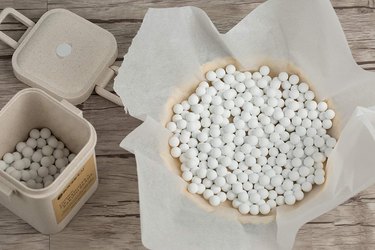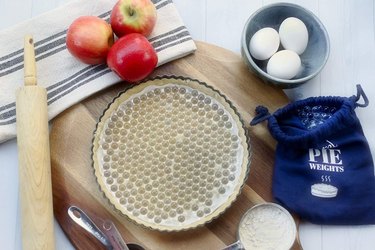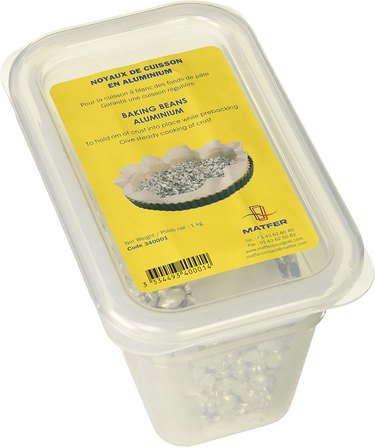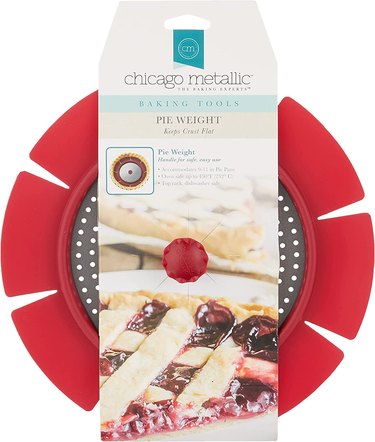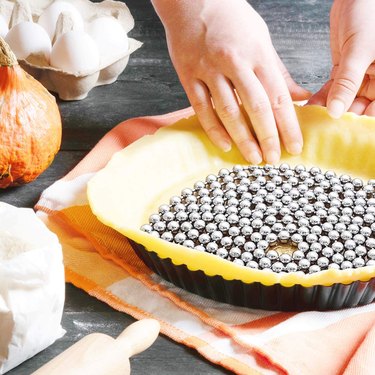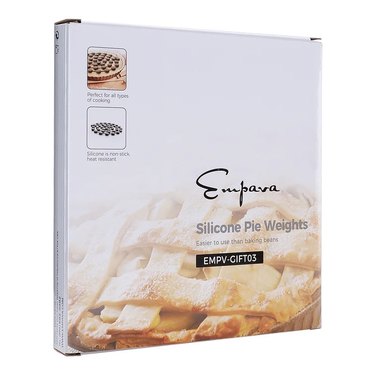Pies with creamy or custardy fillings can't simply be filled and baked like a fruit pie, because that's how you get a soggy bottom. Instead, most cream pie recipes start with baking an empty crust - bakers call this "blind baking" - and then adding the pie filling afterwards. The only issue with this technique is that the crust will tend to puff at the bottom and shrink back at the edges. The trick to getting perfect pie crust is to use pie weights, which hold the dough in place and prevent it from puffing. To help you decipher which kind of pie weights will be best for you, we count down the top contenders in order of their versatility and performance. And yes, we'll give you an outstanding example in each category.
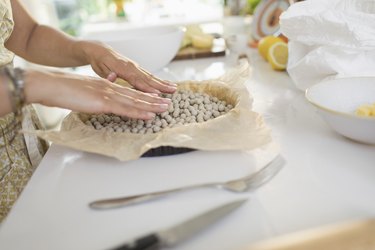
Video of the Day
The Case for Using Pie Weights
Your granny might give a disapproving sniff at the idea of paying good money for pie crust weights, when your kitchen already contains plenty of acceptable substitutes. Dried beans are one of the most common, and in fact ceramic and metal pie weights are often sold as "baking beans" for that reason. Rice is another common option, and so is granulated sugar. None of these are really ideal. Rice and beans don't conduct heat very well, so your pie crust will take longer to get crisp. They'll also absorb oil from your dough and odors from your kitchen, which shortens their lifespan. Also they won't be much good for cooking with, afterwards, except for sugar (which caramelizes lightly, and only tastes better as a result). Considering that pie weights are reusable for years, you'll likely save money in the longer term as well as getting better results.
Video of the Day
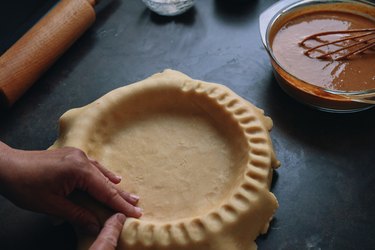
What to Consider When Purchasing Pie Weights
Material: There are a couple of important characteristics that all good pie weights share. First and foremost, they must be food safe and heat resistant. They should also be easy to clean, since fat and flour will accumulate on them over time. They should also provide some weight, since their whole purpose is to hold down your crust as it bakes. All of the options we'll look at combine these traits in varying degrees.
The size of your pies: A pie baked in a shallow, disposable 8-inch foil pan—the kind you might take to a potluck—requires a relatively small quantity of weights. A pie baked in a 10-inch deep dish pan, or an 11-inch tart pan, will require a lot more. The weight of the package is less important than the volume, when you're comparing (because the weight will vary, depending on the material). Take a close look at the packaging and read the reviews: It's entirely possible you may need more than one package of a given brand in order to blind bake your pie shell properly.
Size and weight: Your weights should be reasonably consistent in size, and—up to a point— smaller is usually better. Smaller size means the weights will fit together more closely on your crust, leaving fewer open spaces where the pastry can still puff up. The flip side is that you'll want the weights to still be hefty enough to effectively keep the crust flattened.
Conductivity: Most pie weights are made of ceramics or metal, which are reasonably good at conducting heat. That means they'll actively help your crust bake, as opposed to simply holding it in place. Silicone pie weights, and common substitutes like rice or dried beans, are poor conductors of heat and may mean you'll need to bake your crust longer in order to get an acceptable result.
Tip
How to use pie weights:
- Roll your dough to the correct size, and transfer it to your pie plate.
- "Dock" your dough by pricking it thoroughly with a fork (this is optional, but also helps prevent puffing).
- Chill the dough for at least 20-30 minutes, to minimize shrinkage during the baking process.
- Cover the dough with a piece of parchment paper, non-stick foil, or lightly oiled foil.
- Pour the weights into the parchment liner, spreading them around to evenly cover the bottom of the pan, and up the pan's sides as far as they'll go.
- Bake according to the instructions in your recipe.
Ceramic Pie Weights
K RocksHeat Ceramic Pie Weights, 1 kg/2.2 lb
If you peek into the kitchen at a commercial bakery to see what type of pie weights they use, it will almost certainly be ceramic. Ceramic balls tick all of the right boxes: They're food safe, they're non-absorbent (or at least, the good ones are) and they provide enough weight to do the job without being a pain to handle. Bakers also love them because of their heat conductivity, which helps bake a crispy pie crust or tart shell with no pale, underdone areas. Our pick in this category is the weights from K RocksHeat. They're rated for up to 600 degrees Fahrenheit (most competitors recommend a maximum of 480 degrees) which is hotter than you'll normally bake a pie crust, but it means they'll never approach their limits in normal use. Another positive is that the package contains over 2 pounds of weights, ample for even a deep 9- or 10-inch pie. With many competitors you'd need to buy two or more packages to get enough weights. If you need one more reason to buy this brand, the weights' sustainable packaging (made from wheatstraw) is a nice bonus.
Glass Pie Weights
Gretel Borosilicate Glass Pie Weights
Glass pie weights are much less common than the ceramic variety, but when done right they're an excellent alternative. Low-cost ceramic weights are prone to generating dust (our top pick is fired at a higher temperature, so they're not susceptible to that flaw), which you won't get with glass, and glass weights are impervious to oil and "off" flavors and supremely easy to clean. These pie weights from Gretel are made of high-temperature borosilicate glass - the same stuff used in labs, and in old-school Pyrex - which is highly resistant to thermal shock. Accordingly, like our previous pick, they're rated for temperatures of up to 600 degrees Fahrenheit. They also conduct heat very well, to help your pie dough bake evenly. So why were they not the top pick? First, there's some risk of them shattering if dropped, which is certainly a negative. The second is that they're slightly higher in price. Otherwise, they're an excellent all-round option.
Metal Pie Weights
Matfer Bourgeat Aluminum Pie Weights
Another premium option for pie weights is aluminum. Aluminum is well known for its excellent heat conduction, which means it will help you bake pie crust your neighbors will envy (no doughy spots). It's also not going to generate dust like low-cost ceramics can, or shatter like glass can, and it's both non-rusting and easy to clean. The only downside is that they're hard to find outside of commercial suppliers, and a few high-end kitchenware purveyors like French manufacturer Matfer Bourgeat. This set from Matfer—better known for its superb copper cookware—provides 1 kg/2.2 lbs of weights in a sturdy and practical plastic storage case, which you'll appreciate between uses. The only real drawback to these aluminum weights is their price. A pragmatic alternative is to buy stainless steel ball bearings in bulk, as long as you're careful to buy them in a grade of steel that's rust-resistant.
One-Piece Pie Weight Discs
Chicago Metallic Pie Weight
This is an outlier in our review, because it's not "pie weights" in the usual sense. Instead of pouring a quantity of small individual weights into your pie crust, this clever alternative from Chicago Metallic gives you a one-piece option. It consists of a round metal disc in center, with perforations to allow airflow, and a silicone ring - rather resembling flower petals - around the edge. Just center the disc in the dough, press the silicone edges firmly to the sides of your pie plate and bake! The company claims it will work for any pie from 9 to 11 inches in diameter, and it's rated for up to 450 degrees Fahrenheit. While it's a good idea in theory, in practice you may find that the metal disk doesn't lift away cleanly from your crust when you try to remove it. Also, because the silicone edges don't conduct heat like the metal disc does, you'll find that it may leave your crust unevenly baked. Despite those quibbles it's definitely a viable option for anyone who doesn't want to fuss with the standard kinds of pie weights. It's even dishwasher safe (top rack only) for easy cleanup.
Metal Chain Pie Weights
Hannah’s Baking Pie Weights Chain 15 Foot
As functional as conventional pie weights are, some bakers don't care for them. Pouring individual weights back and forth from their storage container is inconvenient, they can be spilled and disappear under appliances, or your kids (or fur babies) may find them entertaining to play with. That's the logic behind pie chains, which essentially take ball bearings (aka, metal pie weights) and link them up to make a chain. That way all the pieces stay together, and removing it from your crust after baking is as simple as finding either end and lifting. In practice, these aren't quite as functional as one might wish. Some chains are so short they'll barely cover the bottom of the crust, or so light they don't weigh it down effectively. This one from Hannah's Baking, at a full 15 feet in length and approximately 12 ounces' weight, will do the trick for most pies. Just start in the middle and coil it in a spiral to the outer edge, and then up the sides. If you have an extra-large deep-dish pie plate or tart pan to contend with, you might find you're better off to order a 2-pack of the company's 10-foot chains instead. Either way they're reusable and dishwasher safe, though you'll want to be sure they're completely dry before putting them away.
Silicone Pie Weights
Empava Non-Stick Silicone Pie Weights
Metal pie weight chains are often too light to hold the pie down, or leave large enough gaps for it to still puff. The same holds true for the limited number of silicone pie weights, which are usually also constructed in chain form, and with the added negative that silicone transfers heat very poorly. This offering from Empava is a fair example, with just 40 silicone beads spaced out along its 46-inch length. You'll use it in much the same way as a steel chain, coiling it inside the pie crust to cover as much of the surface as possible. You'll inevitably leave spaces in all but the smallest pie shells, so you may also need to "dock" the dough with a fork to help keep it from puffing. On the upside, the silicone-coated chain is completely dishwasher safe, and silicone's heat resistance means you'll be able to handle it fearlessly after a very short cooling period.
